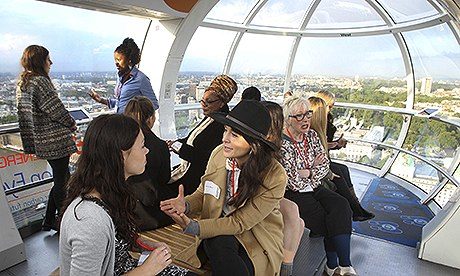
Thousands of campaigners, online activists and girls around the world are marking the second international day of the girl on Friday. The UN has set this year's theme as innovating for girls' education, with official events focusing on how technology and creative thinking can "propel girls' education forward''.
In London, 200 schoolgirls from across the city attended the Women of the World (Wow) festival on the Southbank to celebrate the "formidable strength and power of girls".
They were joined by British singer-songwriter Jessie Ware and influential women from business, politics and the arts for a session of mass "speed mentoring" on the London Eye. The iconic ferris wheel will turn pink and white at dusk on Friday to mark the occasion.
With the announcement of the Nobel peace prizewinner on Friday, conversations about nominee Malala Yousafzai, the Pakistani schoolgirl who survived an assassination attempt by the Taliban, were never far from people's lips. Many hoped she would add the Nobel prize to her list of accolades.
Although Malala didn't win, the girls at the Eye didn't seem to mind. Naphysa Awuah, 13, from Tower Hamlets, predicted people would look up to the schoolgirl for years to come, as someone who stood up for what she believed in and fought for education. "That's a good enough prize," she said.
Saiyata Mobassharaton, 14, also from Tower Hamlets, agreed, pointing out that "it doesn't matter if you don't get right to the top, if you're good, you're good enough".
Conversations turned to girls facing the prospect of an early and forced marriages, and those who have to battle for gender inequality or for the right to be heard – real obstacles faced in developing countries every day.
Across the developing world, one in seven girls is wed before her 15th birthday, with some such marriages having tragic consequences, such as the case of the eight-year-old Yemeni bride who reportedly died on her wedding night.
Under-15s are also at the greatest risk of female gential mutilation (FGM), which can cause severe bleeding, infections and sometimes death. FGM is internationally recognised as a violation of human rights, and the World Health Organisation has said it "reflects deep-rooted inequality between the sexes, and constitutes an extreme form of discrimination against [girls and] women". Last year, the UN passed a resolution against the practice.
Jude Kelly, artistic director of the Southbank centre and founder of Wow, says girls need the "proper tools to make their way in the world, something to unite around''. The priority is education, she adds.
Some 60 million children are out of education, most of whom are girls. The right to education underpins everything, in all countries, Kelly says.
Tell us how you've been celebrating international day of the girl. What theme have you chosen? How helpful are days like this for making progress on girls' rights?
Post your comments in the thread below or add to the debate on Twitter @Gdndevelopment. If you have any problems posting, or would prefer to comment anonymously, email us at development@theguardian.com and we'll add your views to the thread.

